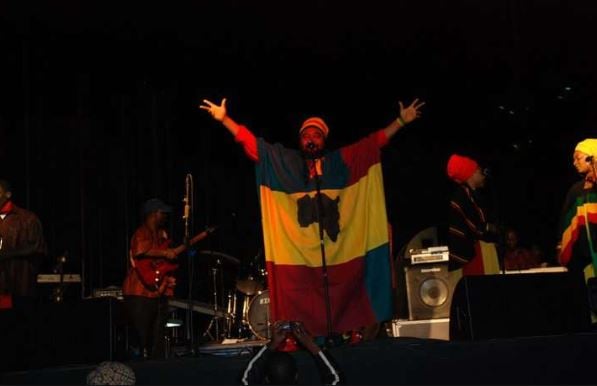Wielding his blunt message as a weapon, Ras Kimono, while he held sway, dominated the Nigerian music scene and cultivated many-a-acolyte with his conscious songs.
The dreadlocked legend lived and breathed reggae in all of its entirety. He used the genre to speak, without ceasing, of the ills of the land and to fight the cause of the oppressed.
Even towards the last years of his life when reggae waned and dancehall blossomed in the Nigerian music industry, Kimono firmly bore the touch like a blind loyalist, continuing to charge the young ones to use the genre to speak truth to power.
He once famously said: “As long as Ras Kimono lives, then reggae is still alive in Nigeria” but now that he’s dead, what becomes of the genre made popular around these parts by the departed icon?
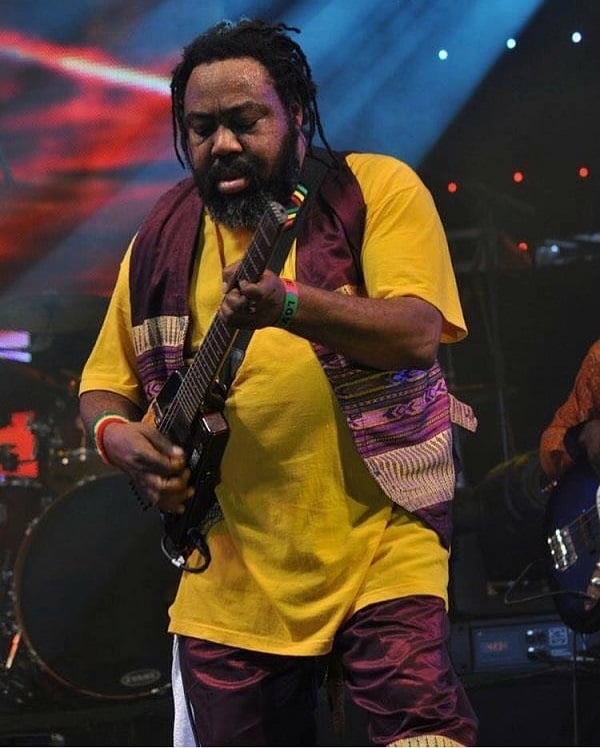
‘SUPERSTAR OF SUPERSTARS’
Ras Kimono inspired many musicians, some of which include Austin Peter, Daddy Showkey, and Kenny Saint Brown who once described him as the “the superstar of the superstars when we were growing up”.
During Kimono’s 60th birthday, which would be his last, Showkey spoke of how the Rastafarian hugely impacted and inspired his music and lifestyle.
He was effusive in praise of the man he called “father”.
“He gave me the platform that made me the Showkey that I am today. He is my father, I carry dreadlocks because I want to be like him,” Showkey had said.
Born in May 1958, Ras Kimono, real name Okeleke Elumelu, had his first musical exposure with The Jastix, a group which comprised Amos McRoy, Black Rice Osagie and Majek Fashek.
The musician would later, on his own, release a debut album Under Pressure, led by the single ‘Rhumba Stylee’, a massive hit in 1989.
Under Pressure was released on the Premier Music label, earning Kimono continental stardom and acclaim.
During the course of his career, Kimono toured Africa, Europe and the United States with his Massive Dread Reggae Band.
‘ADVOCATE OF THE PEOPLE’
Kimono was a mouthpiece of the people in principle and in practice. To have a firsthand feel of the tribulations of the downtrodden, he never strayed far from them, no matter what fame brought his way.
In multiple interviews, he listed his musical inspirations as Jehovah and the suffering of the common man.
“I live where the people live so I can see the tribulation they are going through; suffering and the humiliation, so we can put it into our music and expose it.”
Kimono was no self-serving, all mouth no action conscious reggae musician. He truly believed in what he preached and lived by it.
He once said If he does not expose hardship and injustice, “who will do it for the people?”
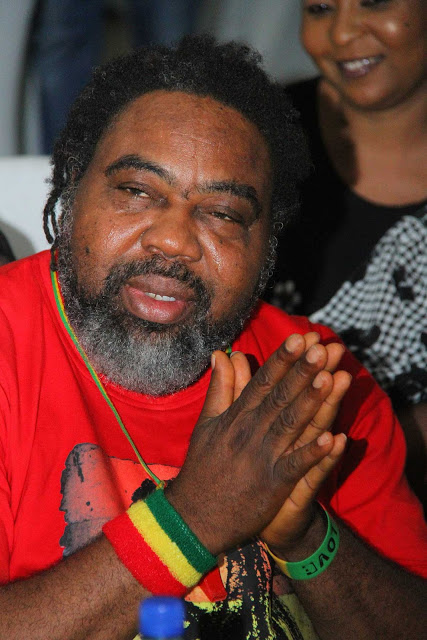
‘LEGEND PISSING ME OFF’
Legendary status is attained through years of consistent success and longstanding influence, and while Ras Kimono can be rightly considered a legend, the late singer will protest at being given the title if he were alive.
An interviewee once called him a legend and he replied, saying: “If you’re calling me legend, then what will you call Sunny Ade, Ebenezer Obey who are alive? The ones that are dead, Sunny Okosun, Oliver De Coque, Osadebe, what will you call them? Icon?
“Nowadays everybody is saying he is a legend, legend, legend and that word is pissing me off. So, at the end of the day, people don’t even know the worth of a legend. When people call me legend I’m indifferent about it.”
Kimono may have been indifferent about the word, but when the cap fits… the cap fits.
REGGAE vs DANCEHALL
Like a mother hen protects her chicks fiercely, jealously and lovingly, so did Kimono care for and tend to the genre called reggae.
His was a life of sacrifice; sticking to pure reggae and churning out pro-masses songs, defeating the temptation of crossing over to the dancehall of luxury.
Hence, he made sure to succinctly and effortfully point out the difference between reggae artistes and dancehall artistes — at any given chance.
“A lot of reggae musicians like us, were not rich because we don’t sing what they want us to sing.
“Reggae artistes are Ras Kimono, Majek Fashek; apart from that, other youth dem are dancehall artistes. They just want to have fun and make money.
“But reggae, you have to deal with truth and wrong and face the government squarely.”
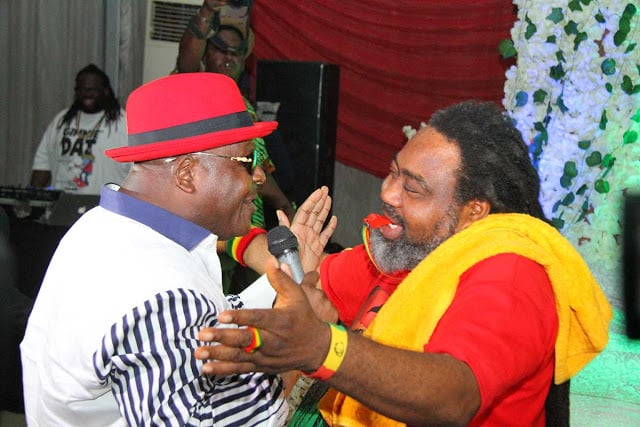
KEPT DREADLOCKS AND DIDN’T TASTE ALCOHOL FOR DECADES
Ras Kimono has a discipline worth emulating. All his life in music, he never tasted alcohol or smoked despite being surrounded by both.
He often told anyone who cared to listen that “I have never smoked and I don’t drink alcohol”.
Kimono said he never partook in the sexual orgies and booze benders associated with the celebrity life.
The peer pressure and overwhelming urge to indulge never broke Kimono. Such was his discipline.
The same discipline could be seen in his devotion to his locks, which he maintained for over 36 years.
The dreadlock was in existence for as long as his career as an entertainer lasted, and throughout that period, Kimono was an ardent vegetarian.
FELA-INSPIRED HIT SONG
Kimono, a few years ago, revealed that one of Fela Anikulapo-Kuti’s many incarcerations inspired ‘Natty Get Jail’, a major hit song of his.
On how the song came to be, Kimono said he wrote it when Fela was locked up, but the Afrobeat maverick secured bail before he could put out the song.
It was originally titled ‘Fela Get Jail’ but had to be renamed after Kimono insisted on its release.
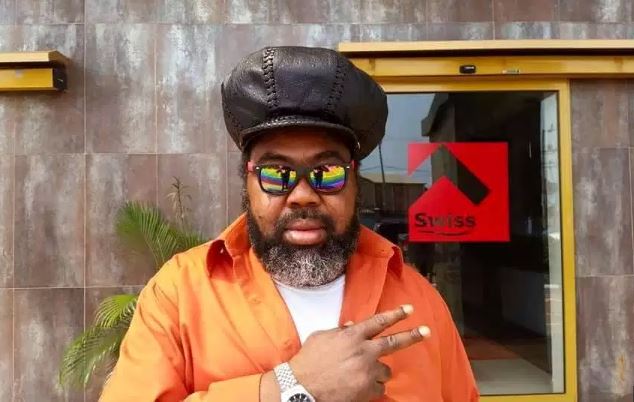
In 2017, after 36 years in the music industry, Kimono remained unyielding, sticking to conscious music which he said had “brought me fame and fortune”.
Even then, Kimono maintained that “present day reggae artistes are scared of singing about crimes, corruption, killing, rape and other bad stuff, so many of them are shying away from the truth”.
Kimono, who now takes his place among Jah’s soldiers in Zion, was a fiery champion of the masses who used reggae music to fight a lifelong battle for equal rights and against injustice.
Copyright 2024 TheCable. All rights reserved. This material, and other digital content on this website, may not be reproduced, published, broadcast, rewritten or redistributed in whole or in part without prior express written permission from TheCable.
Follow us on twitter @Thecablestyle

